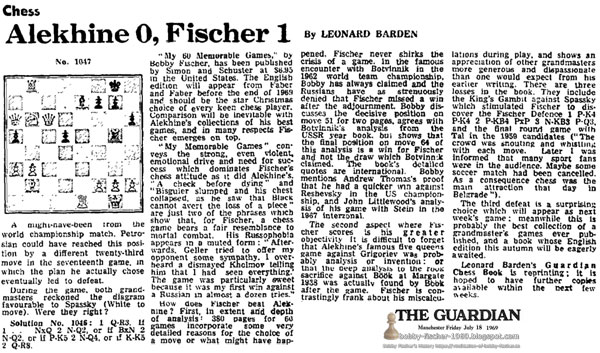The Guardian, London, Greater London, England, Friday, July 18, 1969 - Page 6
Alekine 0, Fischer 1
“My 60 Memorable Games,” by Bobby Fischer, has been published by Simon and Schuster at $6.95 in the United States. The English edition will appear from Faber and Faber before the end of 1969 and should be the star Christmas choice of every keen chess player. Comparison will be inevitable with Alekhine's collections of his best games, and in many respects Fischer emerges on top.
“My Memorable Games” conveys the strong, even violent, emotional drive and need for success which dominates Fischer's chess attitude as it did Alekhine's. “A check before dying” and “Bisguier slumped and his chest collapsed, as he saw that Black cannot avert the loss of a piece” are just two of the phrases which show that, for Fischer, a chess game bears a fair resemblance to mortal combat. His Russophobia appears in a muted form: “Afterwards, Geller tried to offer my opponent some sympathy. I overhead a dismayed Kholmov telling him that I had ‘seen everything.’ The game was particularly sweet because it was my first win against a Russian in almost a dozen tries.”
How does Fischer beat Alekhine? First, in extent and depth of analysis: 380 pages for 60 games incorporate some very detailed reasons for the choice of a move or what might have happened. Fischer never shirks the crisis of a game in the famous encounter with Botvinnik in the 1962 world team championship. Bobby has always claimed and the Russians have as strenuously denied that Fischer missed a win after the adjournment. Bobby discusses the decisive position on move 51 for two pages, agrees with Botvinnik's analysis from the USSR year book, but shows that the final position on move 64 of this analysis is a win for Fischer and not the draw which Botvinnik claimed. The book's detailed quotes are international. Bobby mentions Andrew Thomas's proof that he had a quicker win against Reshevsky in the U.S. championship, and John Littlewood's analysis of his game with Stein in the 1967 interzonal.
The second aspect where Fischer scores is his greater objectivity. It is difficult to forget that Alekhine's famous five queens games against Grigoriev was probably analysis or invention: or that the deep analysis to the rook sacrifice against Book at Margate 1938 was actually found by Book after the game. Fischer is constrastingly frank about his miscalculations during play, and shows an appreciation of other grandmasters more generous and dispassionate than one would expect from his earlier writing. There are three losses in the book. They include the King's Gambit against Spassky which stimulated Fischer to discover the Fischer Defence
1 P-K4 P-K4
2 P-KB4 PxP
3 N-NB3 P-Q3, and the final round game with Tal in the 1959 candidates (“The crowd was shouting and whistling with each move. Later I was informed that many sport fans were in the audience. Maybe some soccer match had been cancelled. As a consequence chess was the main attraction that day in Belgrade.”)
The third defeat is a surprising choice which will appear as next week's game: meanwhile this is probably the best collection of a grandmaster's games ever published, and a book whose English edition this autumn will be eagerly awaited.
Leonard Barden's Guardian Chess Book is reprinting: it is hoped to have further copies available within the next few weeks.























